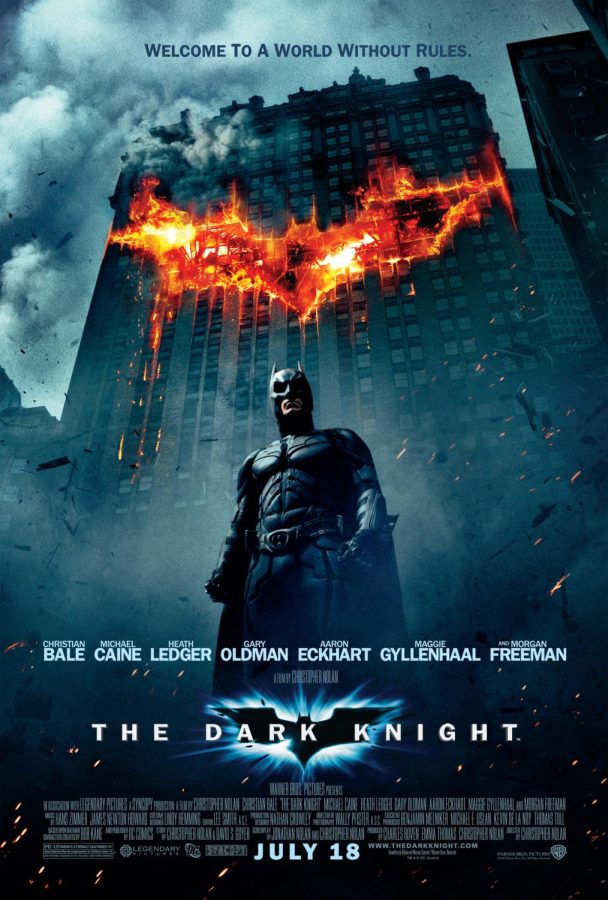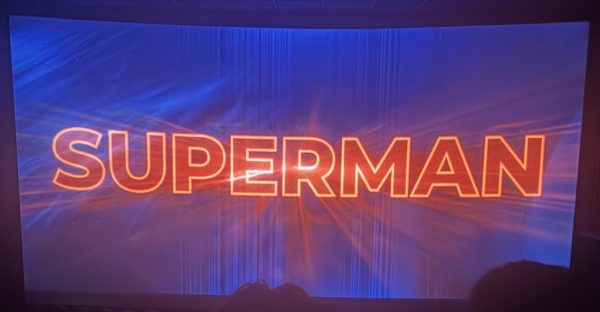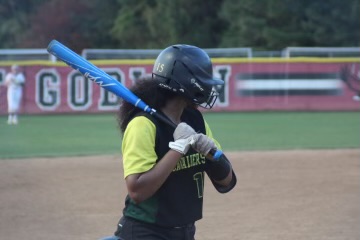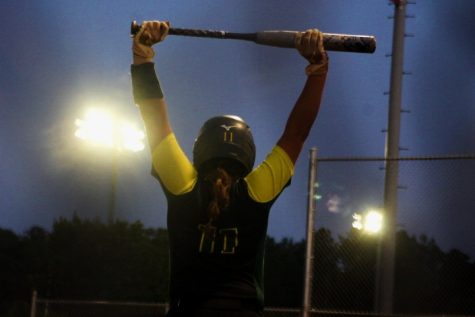GUEST: Corruption and justice in Christopher Nolan’s ‘The Dark Knight’
Our Guest film reviews are a collaboration with Billy Kaskay’s Ethics and Culture in Film elective.
“The Dark Knight” is a 2008 neo-noir superhero action movie and the second installment in Christopher Nolan’s Batman trilogy, with Christian Bale playing the role of Batman/Bruce Wayne. This dark and thrilling two-and-a-half hour crime drama is widely regarded as “one of the best superhero films ever made,” and is best known for its suspenseful shots, tense score, captivating plotline and Heath Ledger’s incredible performance as The Joker (Paste 2009).
The film opens with a group of people in clown masks robbing a Gotham City bank and killing each other off for a higher share of the profit until one man, soon revealed to be The Joker, remains. The Joker falls in league with a local crime syndicate trying to hide their illicitly stored funds, which The Batman and his associates are trying hard to bring to light. On Batman’s team are his trusted butler Alfred, Police Commissioner Lt. James Gordon and the district attorney and Gotham’s “white knight” politician, Harvey Dent. Batman/Bruce Wayne’s childhood friend and former love interest Rachel Dawes, is now dating Dent. The Joker begins killing people and causing chaos in Gotham, claiming that he will only stop if The Batman reveals his identity. Dent claims that he is The Batman in order to draw out the Joker and they succeed in taking him into custody. However, it all works out for the Joker’s scheme, as his associates kidnap Rachel and Harvey Dent and hide them in separate rooms of a warehouse as the Joker escapes from prison. Batman, intending to rescue Rachel, is sent by the Joker to Dent’s location instead, and a rigged explosion ends up killing Rachel and disfiguring half of Dent’s face.
More crime and chaos ensue when the Joker creates incentives for the people of Gotham to kill each other to prevent other events, such as blowing up a hospital, and two ferries full of people. These events are ultimately avoided, as Bruce Wayne saves a specific man being targeted and the hospital in question is evacuated before the explosion is set off, and the two ferries, one full of innocent civilians and one full of convicted criminals, refuse to detonate the other. The Joker convinces the formerly-heroic Dent, now disillusioned and calling himself “Two-Face”, to take revenge on all those who indirectly contributed to Rachel’s death. The Joker is soon apprehended and taken into police custody, and Batman tells Lieutenant Gordon to pin Two-Face’s crimes on The Batman himself, so that Harvey Dent can still be a hero and an inspiring figure to the public. A police hunt is organized for The Batman, and Dent’s image as Gotham’s white knight is preserved. Christian Bale is a posh, suave Bruce Wayne, but leaves a bit to be desired as Batman. The mystery surrounding his identity is well done when he abruptly vanishes into the shadows and appears from nowhere in certain action scenes, but the voice impersonation is far too deep and gruff to the point of ridiculousness. In addition, Maggie Gyllenhaal’s portrayal of Rachel Dawes isn’t very compelling, but since the first movie where Katie Holmes plays the character instead was not viewed prior to the sequel, this review may be lacking some context.
Aside from these minor acting flaws, It is difficult to find fault with this movie. It has the dark aesthetic of a noir film and the fast-paced action of a superhero flick, combining these genres into a gritty, honest perspective of the iconic masked vigilante. Gotham is a dingy place in need of a hero, but a lot of people are beginning to question this mysterious Batman, and whether his motives are in the best interest of the citizens. The character of Harvey Dent, the young charismatic do-gooder becomes the hero instead, and Bruce Wayne is satisfied to let him take the spotlight, even after his tragic death. Though Rachel Dawes dies first, it is the death of the heroic district attorney that we really mourn. The movie focuses on the heartbreaking transformation of Harvey Dent into Two-Face as the most significant tragedy of the film, how his accident and the loss of Rachel transforms him and shapes his actions and allows him to be influenced by the Joker. Though his heroic image is preserved to the end of his life, it turns out that Harvey Dent, not Batman, is the “Dark Knight” for which the movie is titled. The true star of the movie, however, is Heath Ledger as The Joker. His wild, neurotic performance is appropriately disturbing and unforgettable. Clever one-liners and unsettling tics and confidently delivered lines very clearly outline the kind of character Ledger is trying to portray. The new look of the character is also much more interesting to look at and almost pleasing to the eye compared to Jack Nicholson’s version of the Joker from the Michael Keaton Batman movies. In some scenes with Ledger’s Joker, one can see smears of white makeup on the Joker’s hands, indicating that he applies the makeup himself as messily and creatively and chaotic as he approaches every other aspect of life. Heath Ledger won an Oscar for his performance as The Joker, and is the second actor to ever win an Academy Award posthumously.
The most important themes of the movie are corruption and justice. Harvey Dent is initially a hero fighting for justice, but the tragedy twists him into something cruel and disturbing, and he becomes corrupted by the very man who truly caused Rachel’s death. He reverts to coin-flipping to decide the fate of those he takes revenge on in a cruel rendition of justice. Batman tries to fight for justice and protect the people of Gotham City, but the public’s view of Batman becomes corrupted and they lose their faith in him more and more as The Joker’s killings and chaos ensnare the city. The movie is tied together with a tense, moving score by composer Hans Zimmer, who has produced music for other popular movies and franchises such as “Dune”, “No Time To Die”, “Dunkirk”, “Interstellar”, “Inception”, “Pirates of the Caribbean”, “Gladiator” and “The Lion King”; several of these were also directed by Christopher Nolan.
A five star rating is quite appropriate for this incredible film. There are no other superhero films quite like “The Dark Knight”, none that can surpass the intensity and complexity of Christopher Nolan’s unique filmmaking style. It has won a total of 107 awards, including “Favorite Movie, Favorite Action Movie, Favorite Superhero (Christian Bale as Bruce Wayne/Batman), Favorite On Screen Match-Up (Christian Bale and Heath Ledger) and Favourite Cast” (CNN 2009). It was also the highest grossing film of 2008, and the “fourth film in history to gross more than $1 billion worldwide” (Box Office Mojo 2009). This movie is a terrific find for lovers of crime, drama, neo-noir, action and superhero films, as well as fans of director Christopher Nolan. His films never fail to captivate an audience, with talented actors, an impactful musical score and a great deal of reverence and attention to intimate detail for the story each film tells.












